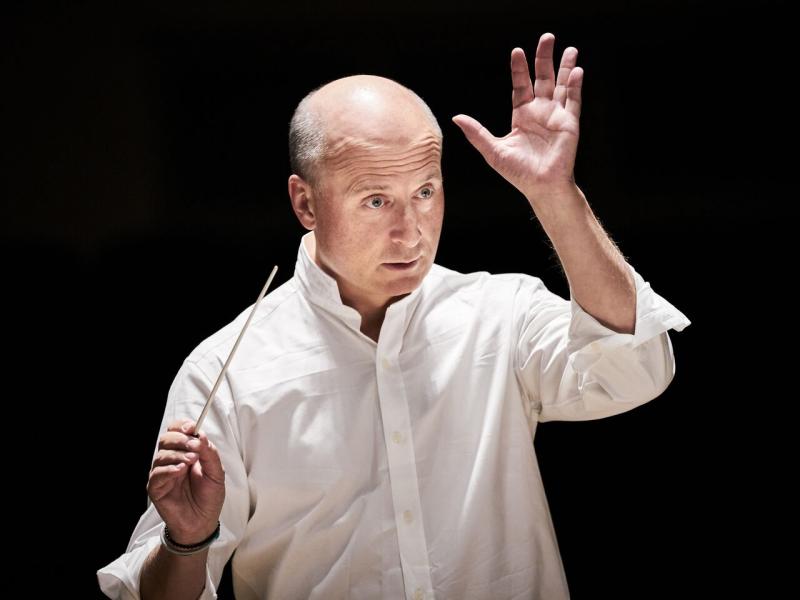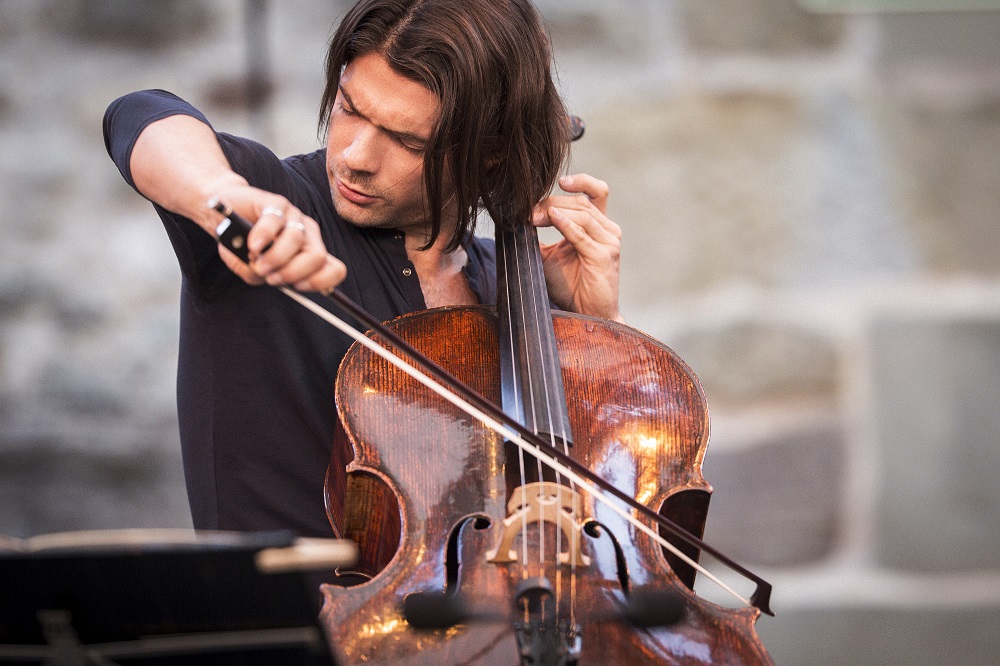Capuçon, Philharmonia, Järvi, RFH review - Dvořák in blazing focus | reviews, news & interviews
Capuçon, Philharmonia, Järvi, RFH review - Dvořák in blazing focus
Capuçon, Philharmonia, Järvi, RFH review - Dvořák in blazing focus
Centrist conductor and cellist strike a perfect balance between passion and precision

You can't have too much Dvořák in a single evening, at least not when the works in question operate at the highest level of volatility and melodic abundance like last night's overture, concerto and symphony.
Rarely did we encounter the Dvořák of sunlit Bohemian woods and fields; the Seventh Symphony, in any case, is closer to the dark German forests of Brahms and even Wagner. For all its showpiece glitter, the Overture Carnival has a manic-depressive essence perfectly captured here; after all, pre-Lenten jollity is all about excess, and Dvořák is quick to spotlight the melancholy soul driven forward by the crazy crowd. Even the central idyll, beautifully underpinned by Jill Crowther's cor anglais, has a sadness about it, and Järvi managed the transitions with queasy flexibility, the natural rubato possessed only by the greatest conductors.
That Capuçon (pictured below by Gregory Batardon) is among the greatest of cellists was announced by the passionate projection of his amazing sound from the start. When I last heard him in this concerto, in a Turkish open-air auditorium, the amplification was unnatural; last night showed that he brings his own, much assisted by his handsome-looking 1701 Matteo Goffriller instrument. The sound has more upper than lower resonance, which may not be to the taste of all cello lovers, but it allows every note to be heard. In a work where the orchestration could sometimes overwhelm the soloist, that's an asset; so is perfect intonation in fierce or flyaway passages where cellists usually can't help a sour note or two.  Yet all that wouldn't be enough if the emotional picture were wanting. Neither Järvi nor Capuçon allowed any slack in the more introspective passages, but the yearning still hit the spot, and both underlined how the journey to a deep contentment is very hard-won; the finale's third, clinching melody told us we'd reached haven, capped by the meditative reminiscences before the final swell. Capuçon is an exceptional chamber musician too, so it was hardly surprising to find him fine-tuned to his orchestral colleagues. So often there's concertante work with the woodwind, as in a Mozart piano concerto, and especially with the first flute; Philharmonia principal Samuel Coles joined Capuçon to make the weave at the start of the development an unforgettable moment, leading to an equally inscaped climax.
Yet all that wouldn't be enough if the emotional picture were wanting. Neither Järvi nor Capuçon allowed any slack in the more introspective passages, but the yearning still hit the spot, and both underlined how the journey to a deep contentment is very hard-won; the finale's third, clinching melody told us we'd reached haven, capped by the meditative reminiscences before the final swell. Capuçon is an exceptional chamber musician too, so it was hardly surprising to find him fine-tuned to his orchestral colleagues. So often there's concertante work with the woodwind, as in a Mozart piano concerto, and especially with the first flute; Philharmonia principal Samuel Coles joined Capuçon to make the weave at the start of the development an unforgettable moment, leading to an equally inscaped climax.
That boded well for the symphony, where the flute always gilds the lily and softens the craggier moments in this most embattled of Dvořák's nine. It can come across as over-manipulated tragedy, but Järvi kept the focus, the energy levels and the elasticity working at all times; I've never heard the Philharmonia play better, or more engagingly, for him. Violins to Järvi's right as well as left offered examplary clarity in the interchanges of scherzo and finale; articulation throughout reigned supreme. The intensity was also helped by running the second, third and fourth movements without a break.
While trombones found a wealth of colour in their ensembles, the horns were not quite on top form; agents and PRs should be careful not to push the considerable talents of last night's principal, BBC Young Musician finalist Ben Goldscheider, too hard too soon. But that's an insignificant cavil in the face of a great interpretation. With Principal Guest Conductors Jakub Hrůša having provided vintage Brahms, and Santtu-Matias Rouvali a legendary Musorgsky/Ravel Pictures, Järvi's Dvořák set a third diamond in the current Philharmonia crown – and it looks like there may be more to come this season.
rating
Explore topics
Share this article
more Classical music
 Bell, Perahia, ASMF Chamber Ensemble, Wigmore Hall review - joy in teamwork
A great pianist re-emerges in Schumann, but Beamish and Mendelssohn take the palm
Bell, Perahia, ASMF Chamber Ensemble, Wigmore Hall review - joy in teamwork
A great pianist re-emerges in Schumann, but Beamish and Mendelssohn take the palm
 First Persons: composers Colin Alexander and Héloïse Werner on fantasy in guided improvisation
On five new works allowing an element of freedom in the performance
First Persons: composers Colin Alexander and Héloïse Werner on fantasy in guided improvisation
On five new works allowing an element of freedom in the performance
 First Person: Leeds Lieder Festival director and pianist Joseph Middleton on a beloved organisation back from the brink
Arts Council funding restored after the blow of 2023, new paths are being forged
First Person: Leeds Lieder Festival director and pianist Joseph Middleton on a beloved organisation back from the brink
Arts Council funding restored after the blow of 2023, new paths are being forged
 Classical CDs: Nymphs, magots and buckgoats
Epic symphonies, popular music from 17th century London and an engrossing tribute to a great Spanish pianist
Classical CDs: Nymphs, magots and buckgoats
Epic symphonies, popular music from 17th century London and an engrossing tribute to a great Spanish pianist
 Sheku Kanneh-Mason, Philharmonia Chorus, RPO, Petrenko, RFH review - poetic cello, blazing chorus
Atmospheric Elgar and Weinberg, but Rachmaninov's 'The Bells' takes the palm
Sheku Kanneh-Mason, Philharmonia Chorus, RPO, Petrenko, RFH review - poetic cello, blazing chorus
Atmospheric Elgar and Weinberg, but Rachmaninov's 'The Bells' takes the palm
 Daphnis et Chloé, Tenebrae, LSO, Pappano, Barbican review - lighting up Ravel’s ‘choreographic symphony’
All details outstanding in the lavish canvas of a giant masterpiece
Daphnis et Chloé, Tenebrae, LSO, Pappano, Barbican review - lighting up Ravel’s ‘choreographic symphony’
All details outstanding in the lavish canvas of a giant masterpiece
 Goldscheider, Spence, Britten Sinfonia, Milton Court review - heroic evening songs and a jolly horn ramble
Direct, cheerful new concerto by Huw Watkins, but the programme didn’t quite cohere
Goldscheider, Spence, Britten Sinfonia, Milton Court review - heroic evening songs and a jolly horn ramble
Direct, cheerful new concerto by Huw Watkins, but the programme didn’t quite cohere
 Marwood, Power, Watkins, Hallé, Adès, Bridgewater Hall, Manchester review - sonic adventure and luxuriance
Premiere of a mesmeric piece from composer Oliver Leith
Marwood, Power, Watkins, Hallé, Adès, Bridgewater Hall, Manchester review - sonic adventure and luxuriance
Premiere of a mesmeric piece from composer Oliver Leith
 Elmore String Quartet, Kings Place review - impressive playing from an emerging group
A new work holds its own alongside acknowledged masterpieces
Elmore String Quartet, Kings Place review - impressive playing from an emerging group
A new work holds its own alongside acknowledged masterpieces
 Gilliver, LSO, Roth, Barbican review - the future is bright
Vivid engagement in fresh works by young British composers, and an orchestra on form
Gilliver, LSO, Roth, Barbican review - the future is bright
Vivid engagement in fresh works by young British composers, and an orchestra on form
 Josefowicz, LPO, Järvi, RFH review - friendly monsters
Mighty but accessible Bruckner from a peerless interpreter
Josefowicz, LPO, Järvi, RFH review - friendly monsters
Mighty but accessible Bruckner from a peerless interpreter
 Cargill, Kantos Chamber Choir, Manchester Camerata, Menezes, Stoller Hall, Manchester review - imagination and star quality
Choral-orchestral collaboration is set for great things
Cargill, Kantos Chamber Choir, Manchester Camerata, Menezes, Stoller Hall, Manchester review - imagination and star quality
Choral-orchestral collaboration is set for great things

Add comment